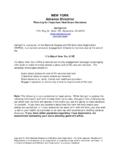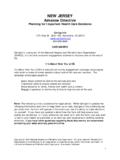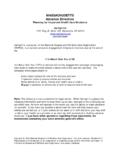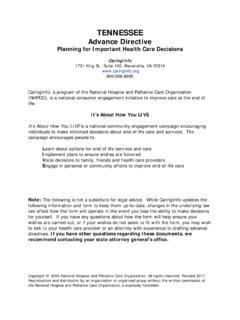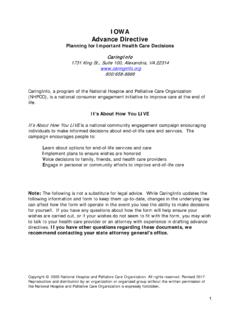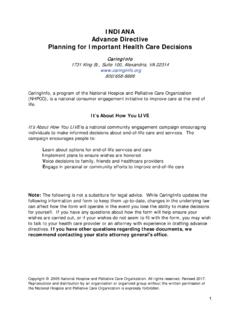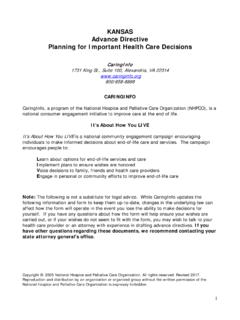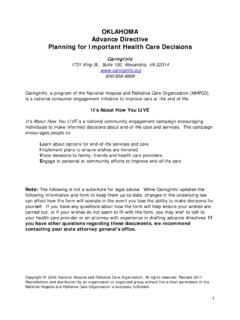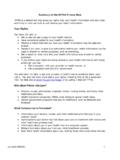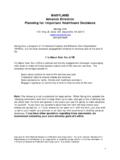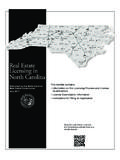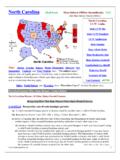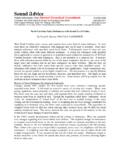Transcription of NORTH CAROLINA Advance Directive Planning for …
1 NORTH CAROLINA Advance Directive Planning for Important Health Care Decisions CaringInfo 1731 King St., Suite 100, Alexandria, VA 22314 800/658-8898 CaringInfo, a program of the National Hospice and Palliative Care Organization (NHPCO), is a national consumer engagement initiative to improve care at the end of life. It s About How You LIVE It s About How You LIVE is a national community engagement campaign encouraging individuals to make informed decisions about end-of-life care and services. The campaign encourages people to: Learn about options for end-of-life services and care Implement plans to ensure wishes are honored Voice decisions to family, friends and health care providers Engage in personal or community efforts to improve end-of-life care Note: The following is not a substitute for legal advice.
2 While CaringInfo updates the following information and form to keep them up-to-date, changes in the underlying law can affect how the form will operate in the event you lose the ability to make decisions for yourself. If you have any questions about how the form will help ensure your wishes are carried out, or if your wishes do not seem to fit with the form, you may wish to talk to your health care provider or an attorney with experience in drafting Advance directives. If you have other questions regarding these documents, we recommend contacting your state attorney general's office. Copyright 2005 National Hospice and Palliative Care Organization. All rights reserved.
3 Revised 2017. Reproduction and distribution by an organization or organized group without the written permission of the National Hospice and Palliative Care Organization is expressly forbidden. 2 Using These Materials BEFORE YOU BEGIN 1. Check to be sure that you have the materials for each state in which you may receive health care. 2. These materials include: Instructions for preparing your Advance Directive , please read all the instructions. Your state-specific Advance Directive forms, which are the pages with the gray instruction bar on the left side. ACTION STEPS 1. You may want to photocopy or print a second set of these forms before you start so you will have a clean copy if you need to start over.
4 2. When you begin to fill out the forms, refer to the gray instruction bars they will guide you through the process. 3. Talk with your family, friends, and physicians about your Advance Directive . Be sure the person you appoint to make decisions on your behalf understands your wishes. 4. Once the form is completed and signed, photocopy the form and give it to the person you have appointed to make decisions on your behalf, your family, friends, health care providers and/or faith leaders so that the form is available in the event of an emergency. 5. NORTH CAROLINA maintains an Advance Directive Registry. By filing your Advance dir ective with the registry, your health care provider and loved ones may be able to find a copy of your Directive in the event you are unable to provide one.
5 You can read more about the registry, including instructions on how to file your Advance Directive , at 6. You may also want to save a copy of your form in an online personal health records application, program, or service that allows you to share your medical documents with your physicians, family, and others who you want to take an active role in your Advance care Planning . 3 Introduction to Your NORTH CAROLINA Advance Directive This packet contains a legal document, a NORTH CAROLINA Advance Directive , that protects your right to refuse medical treatment you do not want, or to request treatment you do want, in the event you lose the ability to make decisions yourself.
6 You may fill out Part I, Part II, or both, depending on your Advance Planning needs. You must complete Part III. Part I is the NORTH CAROLINA Health Care Power of Attorney. This part lets you name someone, called your agent, to make decisions about your health care including decisions about life-prolonging measures if you can no longer speak for yourself. The health care power of attorney is especially useful because it appoints someone to speak for you any time you are unable to make your own health care decisions, not only at the end of life. Part I goes into effect when your doctor determines that you are no longer able to make or communicate your health care decisions.
7 Part II is a NORTH CAROLINA Advance Directive for a Natural Death, which is your state s living will. Part II lets you state your wishes regarding the withholding and withdrawing of life-prolonging measures in the event that you can no longer make your own health care decisions and you are terminally ill, permanently unconscious, or suffer from Advance dementia or other irreversible loss of cognitive ability. The declaration in Part II becomes effective when your doctor determines that you cannot make or communicate your health care decisions and you have one of the conditions that you indicate should trigger your declaration. Part III contains the signature and witnessing provisions so that your document will be effective.
8 This form addresses mental illness in a limited way in Part I. If you would like to make Advance care plans regarding mental illness, you should talk to your physician and an attorney about a durable power of attorney tailored to your needs. Note: This document will be legally binding only if the person completing it is a competent adult who is at least 18 years of age. 4 Instructions for Completing Your NORTH CAROLINA Advance Directive Whom should I appoint as my agent? Your agent is the person you appoint to make decisions about your health care if you become unable to make those decisions yourself. Your agent may be a family member or a close friend whom you trust to make serious decisions.
9 The person you name as your agent should clearly understand your wishes and be willing to accept the responsibility of making health care decisions for you. You can appoint a second and third person as your alternate agent(s). The alternate(s) will step in if the first person you name as agent is unable, unwilling or unavailable to act for you. Any person who is providing your health care for compensation cannot serve as your agent or alternate agent. How do I make my NORTH CAROLINA Health care Power of Attorney legal? In order to make your health care power of attorney legally binding, you must complete it and sign it in the presence of two witnesses and a notary public.
10 Your witnesses cannot: be related within the third degree to you or your spouse, know or have reason to believe that they would be entitled to any portion of your estate upon your death, have any claim against you or your estate at the time you sign the document be your doctor or mental health treatment provider or a licensed health care provider who is an employee of your doctor or of your mental health treatment provider, or be an employee of a health care facility in which you are a patient, or an employee of a nursing home or any group-care home in which you are a resident The notary public must notarize the document after you and the witnesses have signed it.
